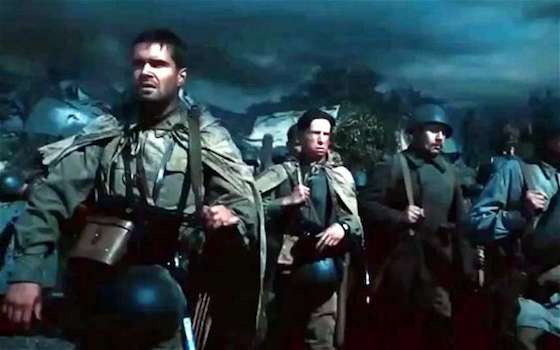- MENU
- HOME
- SEARCH
- WORLD
- MAIN
- AFRICA
- ASIA
- BALKANS
- EUROPE
- LATIN AMERICA
- MIDDLE EAST
- United Kingdom
- United States
- Argentina
- Australia
- Austria
- Benelux
- Brazil
- Canada
- China
- France
- Germany
- Greece
- Hungary
- India
- Indonesia
- Ireland
- Israel
- Italy
- Japan
- Korea
- Mexico
- New Zealand
- Pakistan
- Philippines
- Poland
- Russia
- South Africa
- Spain
- Taiwan
- Turkey
- USA
- BUSINESS
- WEALTH
- STOCKS
- TECH
- HEALTH
- LIFESTYLE
- ENTERTAINMENT
- SPORTS
- RSS
- iHaveNet.com: Movie Reviews

"Stalingrad" Movie Review: 2 1/2 Stars
by Roger Moore
"Stalingrad" is a huge, old-fashioned combat spectacle, a war story told on a vast scale and shown on vast Imax movie screens, in 3-D.
It's Russian, oh so very Russian, an epic of "The Great Patriotic War" that mixes blood-and-guts combat with chest-thumping patriotism and pathos.
And, unfortunately, it's more than a little clumsy, from its absurd framing device to the simple head count of the cast of "fathers" who saved a young woman, and the world, during the "bloodiest battle in history."
In late 1942, Soviet reinforcements cross the Volga River and storm through a wall of fire to seize an apartment building on the front lines. They rescue a young rape victim, Katya (Mariya Smolnikova), and struggle to protect her from the Germans, led by a mournful, war-weary captain (Thomas Kretschmann), who are on the brink of throwing the Soviets out of the city.
Kapitan Gromov, played by an emotional Colin Farrell look-alike (Pyotr Fyodorov), worries that his tiny band will be too busy saving Katya to save Mother Russia. But in the symbolism of the cinema, she is both girl-victim and Mother Russia -- traumatized by war, clinging to vestiges of civilization in her parents' apartment, hellbent on hanging on and having her revenge.
Director Fedor Bondarchuk (of the fine Afghan war thriller "9th Company") stages the room-to-room, hand-to-hand fighting with a brutal, bloody brio. The thoroughly ruined sets, from the riverfront with its improvised rafts floating troops across, to the everything-is-burned-bombed-and-broken apartment blocks, put us inside the battle.
But this film was plainly built for the Putin-esque Soviet -- sorry, Russian -- market. Every excess has an old-fashioned hint of Soviet-era propaganda about it. As interesting as it might be to get a whiff of how the Russians see themselves, Bondarchuk keeps finding ways to turn off overseas audiences.
Take the frame in which the story is told. Bondarchuk's famous actor-director father Sergei ("Waterloo," "War and Peace") plays an elderly Russian doctor telling the story of his mother's survival to a bunch of injured Germans trapped in a building collapse in the Japanese earthquake and tsunami. Heroic Soviet -- sorry, Russian -- rescue teams went there to save the day.
The old doctor tells the story of the battle through the eyes of his mother, who always told him he had "five fathers," the men who saved her and perhaps fathered him during or after the battle.
The problem with that? There are plainly six, not five, men heavily invested in Katya's survival. At one point, they even pose on the steps of the apartment building, six of them. Who was left out of mom's count: the kapitan, the silent opera singer turned killing machine (Aleksey Barabash), the piggish sniper (Dmitriy Lysenkov), the gruff
It's a movie every bit as bloated as the biggest movies Bondarchuk's dad made. In detail and spectacle, "Stalingrad" is hard to beat. Whatever its failings, one can't help but be curious about a story as connected to national identity as this one, a film that, like today's Russia, feels more Soviet than Russian.
MPAA rating: R (for sequences of war violence). Running time: 2:11.
The film "Stalingrad" is an epic look at the battle that turned the tide of World War II. A band of determined Russian soldiers fight to hold a strategic building in their devastated city against a ruthless German army, and in the process become deeply connected to two Russian women who have been living there. The scale of the battle contrasts dramatically with the human drama of the Russian soldiers, the few remaining civilians and their invaders into Stalingrad
'Stalingrad' Movie Review